The People Happy Again Brazil Election
T wenty-five years ago, one of the titans of contemporary Latin American politics fix off on a gruelling two,600-mile bus journey beyond Brazil to take the pulse of the region'southward biggest democracy and hear the voices of its forgotten masses.
"I'll have a mouth like a cricket and ears like an elephant," future president Luiz Inácio Lula da Silva vowed as he began a 20-day listening tour later dubbed "The Journey to the Heart of Brazil".
A quarter of a century later, with Lula in jail and Brazil facing its most unpredictable and divisive presidential election in decades, the Guardian retraced that historic expedition through vii Brazilian states to get a sense of the issues driving the vote – and what might happen when Brazil'southward 147 million voters go to the polls on seven October.
Recife
The journey begins in the north-eastern state of Pernambuco, Lula'south birthplace and the launchpad for his 1993 caravan.
Brazil's northward-eastward is the second nearly populous region, with more than than 39 million voters. Traditionally they accept been loyal to Lula, the man who still enjoys hero condition here for his cause against poverty during his 2003-2011 presidency. Until Lula, who is now serving a 12-year sentence for abuse, was barred from running , polls showed nigh sixty% of voters here backed him.
Matheus Henrique Santana Souza isn't one of them. The president of a grouping called Direita Pernambuco (Rightwing Pernambuco), he is 1 of tens of millions of bourgeois, and overwhelmingly male voters bankroll far-right candidate Jair Bolsonaro who leads polls with about 28% of the vote.
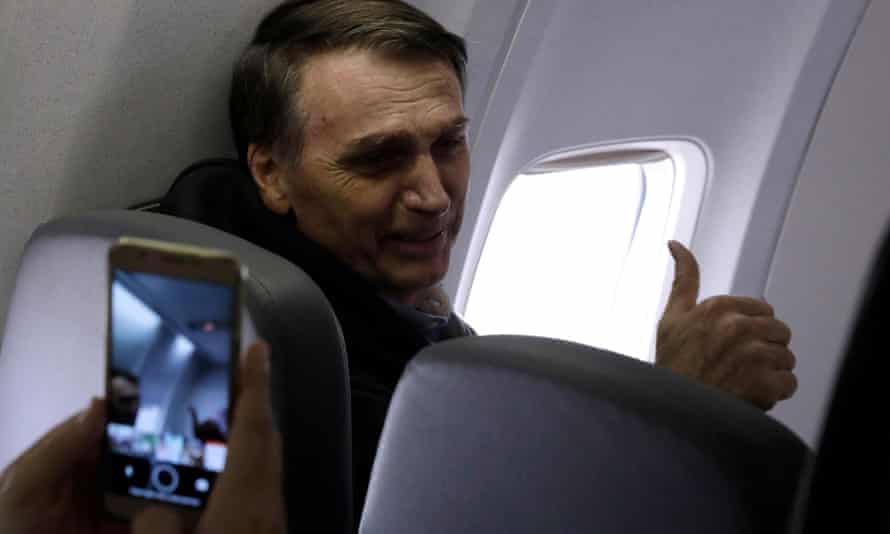
"It's a cultural war," Souza, a 22-year-onetime history student, explains during an interview at a luxury oceanfront apartment in Pernambuco'due south capital, Recife, owned by one of the group's wealthy benefactors.
Souza slammed Lula equally a "scumbag" who, with his Workers' political party (PT) comrades, hoodwinked the Brazilian people and plunged Brazil into economic turmoil.
Afterward the inaugural caravan - which took in seven states from Pernambuco to São Paulo - Lula organized 6 subsequent expeditions, including a 'Water Caravan' through the Brazilian Amazon.
"Today nosotros can say no-one knows this land similar we do," one organizer, the journalist Ricardo Kotscho, after recalled of what became known equally "The Journey to the Heart of Brazil".-
","image":"https://i.guim.co.uk/img/media/e33383b01ddee881598e15c6d40496a269c3b66f/0_56_4473_2684/4473.jpg?width=620&quality=85&auto=format&fit=max&s=25ed1b5f86182b06ae81f1c6b35a1d1a","credit":"Photograph: Daniel Ramalho/AFP","pillar":0}"> Profile Lula's famous 1993 journeying
Show

The 'Citizenship Caravan'
On 23 April 1993 Brazil'south future leader, Luiz Inácio Lula da Silva, arrived in the northeastern city of Recife to kicking off a celebrated expedition chosen the 'Citizenship Caravan'.
For the next xx days, Lula and a grouping of leftist politicians and thinkers retraced the 1952 road-trip his family unit had undertaken when they fled rural poverty in Brazil's drought-stricken north for the southeastern city of Santos.
The journey, fabricated in two rider buses, was partly driven past politics. Lula hoped to garner support alee of the following twelvemonth'due south presidential election.
But it was also an endeavor to shine a light on some of Brazil'southward almost deprived and forgotten corners; ramshackle urban favelas; riverside gilt-mines; sunday-scorched, famine-stricken villages such equally the one where Lula's unlikely rising to the presidency had begun.
"We are irresolute the way you practise politics in this land," Lula told one of the reporters who accompanied the journey.
After the inaugural caravan - which took in seven states from Pernambuco to São Paulo - Lula organized six subsequent expeditions, including a 'Water Caravan' through the Brazilian Amazon.
"Today nosotros tin can say no-one knows this country similar nosotros practise," one organizer, the journalist Ricardo Kotscho, after recalled of what became known every bit "The Journey to the Centre of Brazil".-
Photograph: Daniel Ramalho/AFP
"He's a crook! A thief!" agreed another of the group'southward members, Maxwell Cavalcanti.
Polls evidence lx% of due north-easterners are so disgusted past Bolsonaro'southward poisonous views on gender, race and sexuality, they would not even consider voting for him. "He's a devilish goat," sneered one voter. "A rat's fever," said another.
Merely for Souza and many others, Bolsonaro represents deliverance from what they say is a communist cabal determined to decriminalize ballgame, mollycoddle criminals, and indoctrinate students with dangerous leftist values.
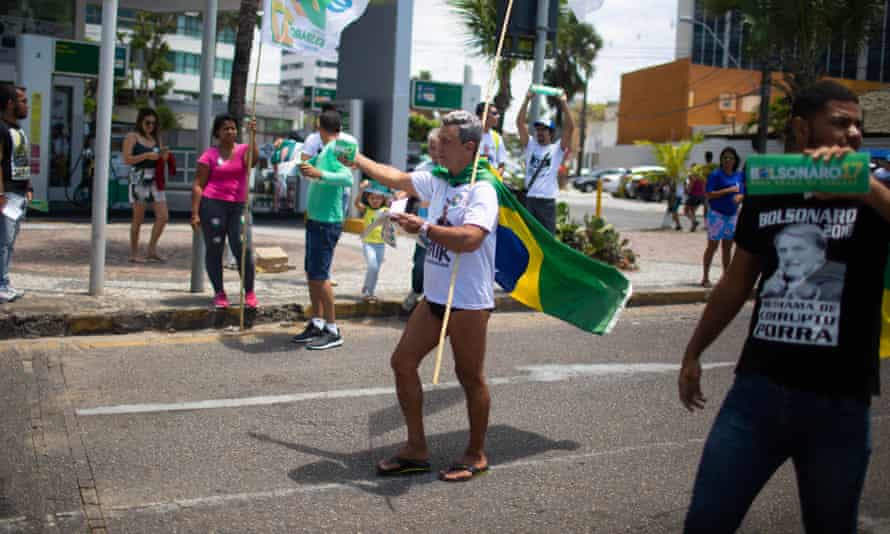
Farther up the beach, banner-waving Bolsonaro campaigners had set store near Brasília Teimosa, a seaside favela known as a hotbed of Lula support. Alfeu França, a speedo-sporting bank clerk with a Brazil flag draped over his shoulders, said he voted Lula in 2002 but was now Bolsonaro to his basic. "The truth is [the PT] has become a criminal faction … at the service of evil."
Garanhuns and Iati
With Lula sidelined, he is relying on his surrogate, Fernando Haddad, to derail the Bolsonaro juggernaut. Simply for that to happen Lula must persuade supporters to back his stand up-in – and fast.
Haddad has soared in polls since being confirmed as Lula's replacement and now occupies second place, with 22% of intended votes. Amid Brazil's south-eastern intelligentsia the 55-year-old erstwhile philosophy lecturer is admired for creating hundreds of miles of bicycle lanes while São Paulo'south mayor.
But in Lula'southward hometown – the official starting point of the 1993 caravan – many nonetheless have no idea who is he.
"Information technology'southward Bada. Dada. It'due south a funny name, isn't it?" grinned Geraldo Alves de Araújo, a 53-twelvemonth-quondam fruit-seller.
"Never heard of him," admitted Arlindo Pereria da Silva, a 64-year-sometime painter. "But Lula says information technology'southward a good idea."
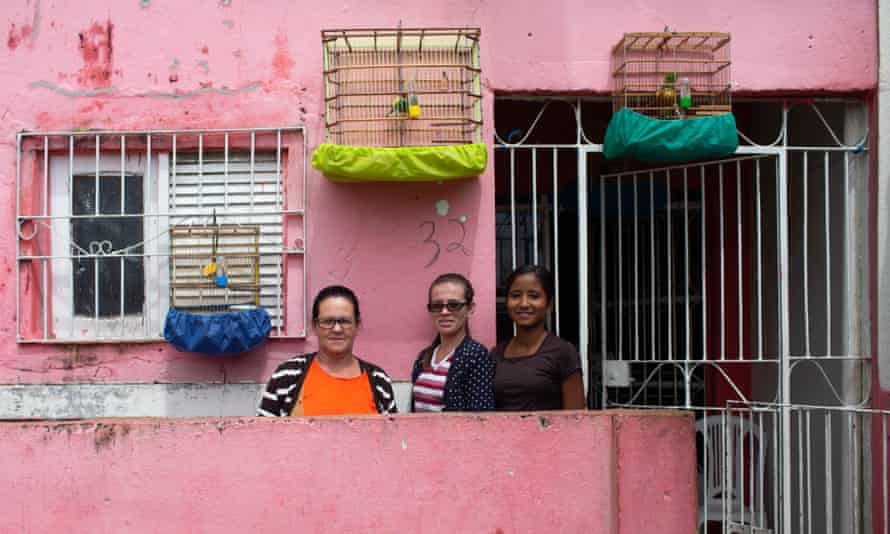
West forth Highway 423, on the depressed outskirts of a boondocks called Iati, where many lack running water and some swallow protected birds to survive, few though had doubts about supporting team Lula. "If Lula backs a donkey, I'll vote for a donkey," said Paulo da Silva, 54, a subsistence farmer who, like many hither, survives on a 95 reais (£xviii) monthly welfare allowance chosen bolsa família that was rolled out under Lula.
"Lula left this place with a full stomach," said Maria Laurentino, a 49-year-old mother in Rua da Taba, a Garanhuns favela Lula visited in 1993.
And Bolsonaro? "He's a demon," she replied, as her neighbours nodded in agreement. "He'southward no good."
Delmiro Gouveia
The next stretch of the caravan cuts across Brazil's sertão, a scorched backcountry of cactuses and cattle carcasses long notorious as the fiefdom of ruthless oligarchs.
When Lula visited, famished, cactus-eating peasants flagged downwards his two-double-decker convoy and pleaded for help. "My trouble's hunger, sir," one adult female told him.
Lula blamed a "shameless" clique of decadent politicians for allowing such poverty to persist. "Brazil's political elite has failed," he proclaimed, in language like to that now being used by Bolsonaro.
20-five years on the hunger has receded but Lula is behind bars, and the finagling goes on.
In June the former mayor of Canapi, one boondocks Lula visited, was sentenced to 28 years in jail for siphoning off millions in public funds. Further west, in Delmiro Gouveia, the mayor was forced from office in 2013 for misuse of public funds.
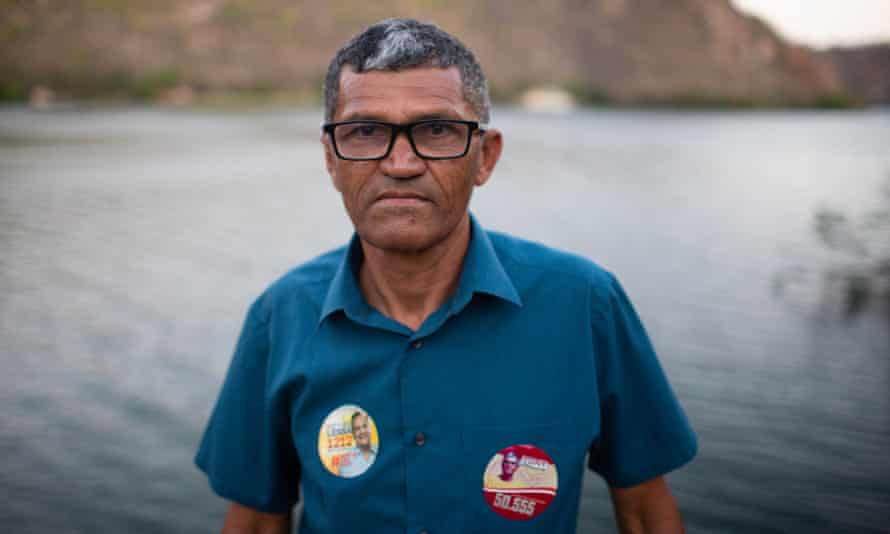
"Politics should be an art, non a business," complained Tony Cloves, a candidate for the Socialism and Liberty party (Psol) in Delmiro who has spoken out confronting the thievery.
That this region, like Brazil as a whole, suffers a chronic corruption trouble is obvious from a billboard at the boondocks's entrance that reads: "Information technology's not politics that turns a candidate into a crook. It'south your vote that turns a crook into a candidate."
Cloves, known locally every bit the Obama do Sertão or Backlands Barack, lamented how many saw politics as a way to get rich: "Nosotros feel this everywhere from Delmiro's town council to the national congress. It's a corrupted system."
Cloves said powerful caciques (chiefs) continued to dominate the region's politics; a vote could be bought for 100 reais (about £19) making information technology almost impossible for upstanding politicians to gain ability.
Meanwhile, politically driven contract killings remained common, with ii councillors gunned down in recent months.
With Brazil reeling from ane of the greatest corruption scandals in world history, presidential hopefuls have vowed to purify their country'due south politics.
But such pledges have been heard before. "There's so much pilfering," said Marinita de Menezes, a 64-yr-erstwhile housewife. "The whole lot of them should be in jail after everything they've stolen."
Feira de Santana
2 hundred miles due south down Highway 110, information technology is the killing voters are worried about.
Feira de Santana, Bahia state's second largest city, has seen its homicide rate increase sharply, and is at present one of the deadliest cities in a land where a record 63,880 lives were lost final year.
A duel between drug factions ways scarcely a day passes without murder.
Crime reporter Gleidson Santos, whose blog chronicles the bloodletting, said many were turning to Bolsonaro for hardline solutions to the violence.
But Santos, a PT-voting journalist – who races to criminal offense scenes on a motorcycle adorned with a sticker of Lula and Haddad – said Bolsonaro's iron fist would do nothing but accelerate the slaughter of young black men. "He's non the way forrad. I'yard sure of it."
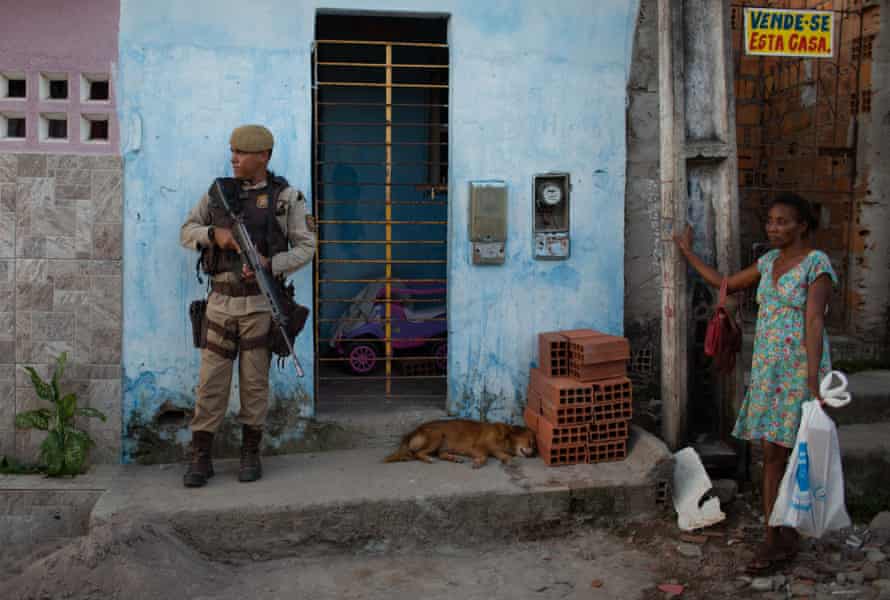
Zé Neto, a local PT politician, agreed bullets were non the solution. "[We demand] more than education, more than social projects."
But on Feira's dirt-poor outskirts, there is little sign of that help arriving. "We're totally forgotten," complained Gisélia Miranda, the leader of ane rundown favela. "The politicians simply think u.s. when elections come around."
Two days earlier a boy had been shot expressionless metres from where Miranda stood – Feira's 296th murder victim this year. A T-shirt hanging from a nearby washing line carried the name of a human being many see as a potential saviour: "Bolsonaro Presidente!"
Teófilo Otoni
Catholic social worker Maria Graciela Bartesaghi Silveira was role of the Motility for Marginalized Women when she started working with sex workers in Teófilo Otoni's brothels in 1981. She has given her life to defending some of Brazil's most vulnerable women and children.
To this day she remembers the day Lula and his caravan dropped in on O Ninho, the social project she founded hither beside Highway 116 to protect the offspring of the sexual activity workers she was supporting.
"The kids loved information technology," Silveira recalled. "Lula truly is a very special person … It was a joy to have him here."
Fast-forward 25 years and that delight has been replaced with dread at what the election of Bolsonaro – who has chosen female person rivals idiots, tramps and unworthy even of rape – might mean for Brazil and its 108 million women.
Women represent 52.iii% of Brazil's electorate and could determine October's vote. Even so many accept lamented the dearth of proposals about women's bug in this year's race, not to mention their participation in it.
Of the 13 candidates, just two are women. Four of the 13 election manifestos fail fifty-fifty to mention the word "adult female"; Bolsonaro'south 81-page document mentions it only once.
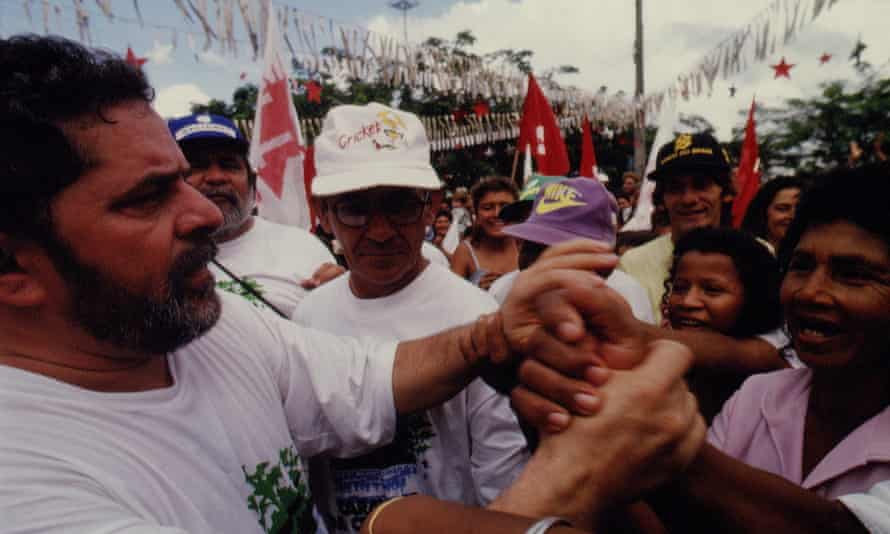
Silveira, 73, said the lack of propositions reflected a broader lack of progress: "Women still come up second. We meet it on TV all the time: women existence beaten, women beingness killed, women being raped. I call up the situation has inverse very fiddling.
"I just don't empathize how a woman could desire to vote for Bolsonaro."
Eight-five miles further on, in the city of Governador Valadares, Cleuzenir Barbosa said she couldn't sympathise why a woman wouldn't. Millions have joined the #EleNão (#Not Him) campaign to scupper Bolsonaro'southward bid for power simply Barbosa – a black female candidate for his Social Liberal political party (PSL) – denied her leader was chauvinist.
"He's a marvellous person," Barbosa, a 46-year-quondam evangelical Christian, gushed. "These feminists who preach the destruction of the family and abortion … they twist Bolsonaro'southward words."
A photograph attached to the bumper of her auto shows the rightwing populist flashing a Churchillian V-sign. "Brazil has spent nearly 20 years under leftist, well-nigh communist regime," she said. "We tin can't take any more than."
Duque de Caxias, a suburb of Rio
Haddad'southward key campaign pledge has been to bring back "the good times" of Lula'due south boom years. Few places need that more than than Parque Vila Nova.
A shabby, sewage-streaked shanty amend known as the Favela do Lixão or the Rubbish Dump favela, the community is but xviii miles north of Ipanema embankment but feels like another world.
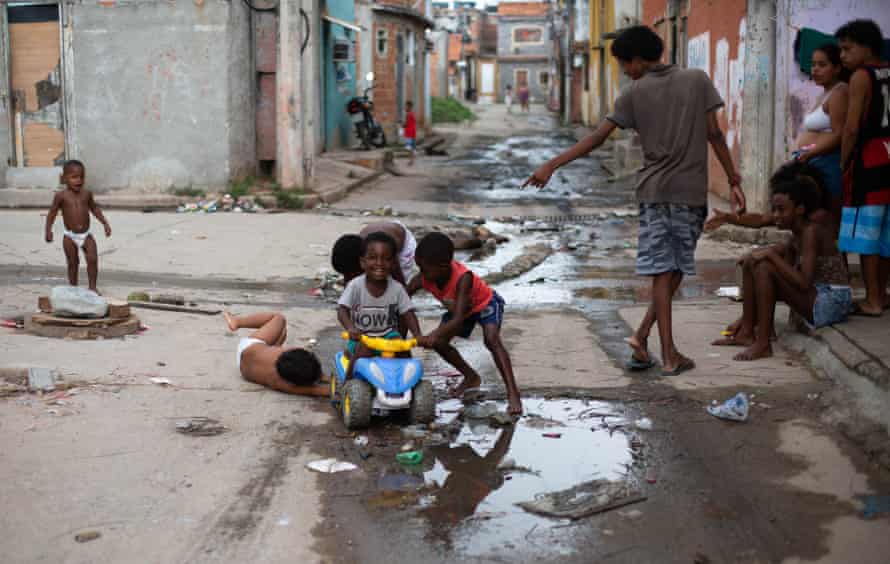
Alessia Almeida, the residents' association president, said most of the settlement's eleven,600 inhabitants scraped by with the assistance of bolsa família. "Without it, I don't know what would become of them," she said.
Paulo César Gomes, a longtime PT member and resident, was amongst those who helped organize Lula'due south 1993 visit, hoping to showcase the forsaken community. Twenty-five years on, "nosotros are however invisible," complained Gomes, whose redbrick shack overlooks a black swamp of sewage.
With Brazil struggling to sally from the worst recession in its modern history, 13 million people out of piece of work, and extreme poverty again on the rise, Haddad's commitment to "make Brazil happy once more" has struck a chord in places similar this.
"When Lula was in power there were jobs for everyone – then the crisis came along and screwed everything," said Eliane Oliveira, a 23-year-onetime female parent-of-ii.
Nearby, three more young, unemployed mothers – Angela, Yasmin and Raiane – sat with their babies and said they likewise would dorsum Haddad.
"In Lula's day, all you had to do to find a job was walk down the street. At present you walk and you walk and you walk and you detect aught," said Raiane, jobless since 2011.
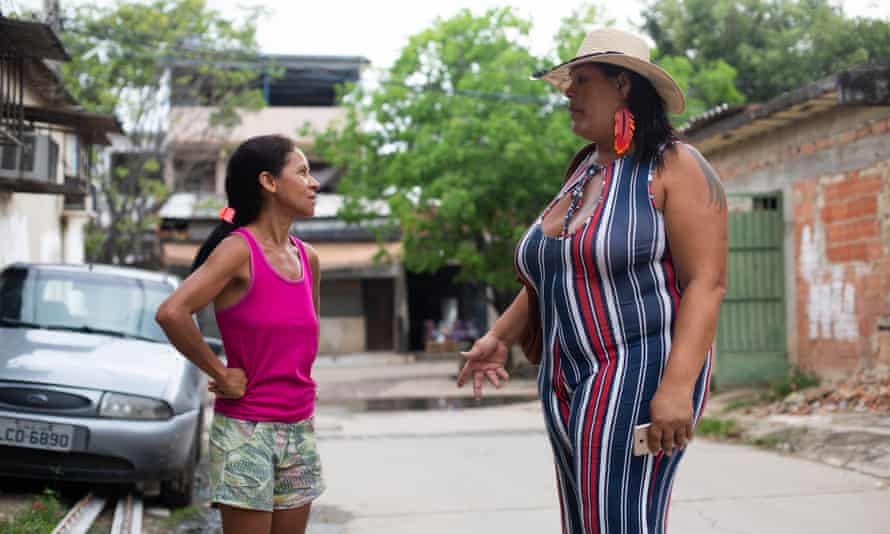
Yasmin, 17, agreed: "Lula stole but he helped like hell."
Almeida, the community leader, said she likewise was dreaming of a Haddad victory – and as a transgender adult female she has more than reason to than near. "I'm scared of what might happen if Bolsonaro gets elected," she said, adding: "Did yous know Brazil is the country that almost kills LGBT? Only imagine what will happen if this man becomes president."
São Paulo
Afterwards 20 days on the road – and at to the lowest degree one instance of goat-meat induced nutrient poisoning – Lula reached his concluding destination, São Paulo state, where he had launched an improbable political career that led to the presidency, then to prison – and which may yet concur some more than surprises.
20-five years later, eight pretenders to Lula'due south old throne gathered in a hilltop TV studio on the outskirts of São Paulo's capital for one of the final presidential debates.
For an hour and a half the candidates sparred over everything from tax policy, job creation and healthcare to Brazil'southward "genocidal" state of war on drugs and the need for more women in politics.
2 absent figures, all the same, towered over proceedings: Lula, forced from the race by his controversial incarceration, and Bolsonaro, confined to a hospital fifteen miles due south after he was stabbed at a campaign issue on 6 September.
One by one, the candidates swore to salve Brazil from the toxic crack that has opened upward between those who love Lula or loathe Bolsonaro, and those who love Bolsonaro or simply loathe Lula.
Ciro Gomes promised to stop "this hateful confrontation that is driving our state towards violence".

Geraldo Alckmin claimed he could rescue Brazil from both the PT's economic incompetence and "the candidate of discrimination".
Marina Silva, a sometime Lula ally and surroundings minister, claimed "a courageous adult female" was now needed "to put the firm in guild".
One time the cameras were turned off, Silva lingered on stage and reflected on the state of her bitterly divided nation.
"Nosotros must be very careful nosotros aren't left choosing between a rock and a hard place," she said. "The rock of the PT government's corruption and the hard place of absolutism and disrespect for democracy and women that Bolsonaro represents."
As her rivals streamed out of the auditorium, Silva insisted: "We can cull a country that is politically democratic, socially just, culturally various, environmentally sustainable and economically prosperous."
Like ideals inspired Lula'due south exhausting pilgrimage across Brazil 25 years ago. Merely with Brazilian voters enraged and disillusioned and drastic for change, they seem unlikely to exist the values that will decide this, the well-nigh rancorous of races for power.
Source: https://www.theguardian.com/world/2018/sep/29/brazil-lula-journey-election-jair-bolsonaro
0 Response to "The People Happy Again Brazil Election"
Post a Comment